

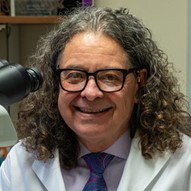 After 43 years of service, Dr. Jeffrey Myers is shifting his focus from the world of pathology to other things too long neglected including family, friends, and music, as he transitions from A. James French Professor of Diagnostic Pathology and Vice Chair for Clinical Affairs and Quality to active emeritus faculty effective January 1, 2025. He will still be around for six months, wrapping up ongoing projects and serving in an advisory role as the department transitions to a future state without him.
After 43 years of service, Dr. Jeffrey Myers is shifting his focus from the world of pathology to other things too long neglected including family, friends, and music, as he transitions from A. James French Professor of Diagnostic Pathology and Vice Chair for Clinical Affairs and Quality to active emeritus faculty effective January 1, 2025. He will still be around for six months, wrapping up ongoing projects and serving in an advisory role as the department transitions to a future state without him.
Myers obtained his MD (1981) and completed residency training (1983-85) at Washington University School of Medicine. A surgical and pulmonary pathology fellowship at the University of Alabama at Birmingham with his long-time mentor and friend, Anna-Luise Katzenstein, followed. Upon completing his fellowship, Myers was hired as an Assistant Professor at UAB in 1985. “I had been on faculty there for about four years when a well-known pulmonary pathologist, Tom Colby, reached out to me at a USCAP meeting to gauge my interest in looking at a job at the Mayo Clinic in Minnesota.” Myers explored the opportunity, but “I was having so much fun in Birmingham that I declined the offer,” Myers recounted. About six months later, Mayo called again as UAB was undergoing a leadership transition. This time he accepted the offer.
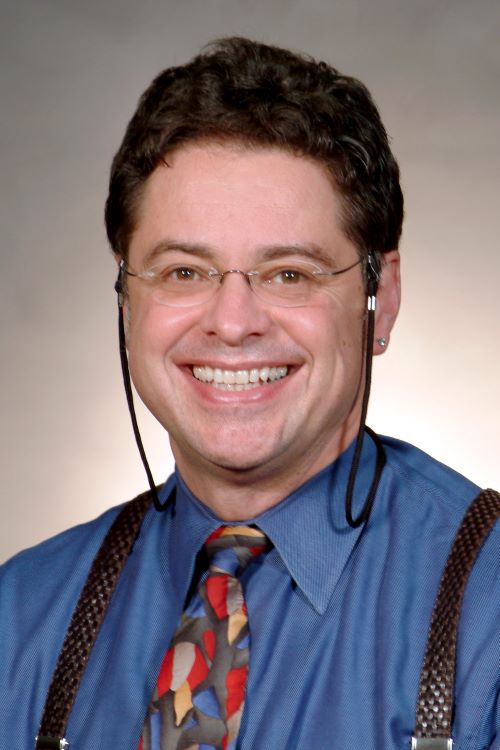 Myers rose through the ranks, becoming a Professor of Pathology in 1996. Along the way, he served as the Chair of Surgical Pathology (1992-93) and Anatomic Pathology (1993-2002). “After being there for about 16 years, I had stepped down as chair of anatomic pathology and was looking for a new challenge when the then-new chair at Michigan, Dr. Jay Hess, reached out to me to see if I might be interested in coming as Director of Anatomic Pathology. He was a great recruiter. I remember being so impressed after my first visit.” Hess contacted him again and visited him in Rochester to make sure he was the right candidate for the position. “He told me that as a student of some of the famous conflicts between AP Directors and Chairs, he wanted to share with me his expectations, and he wanted to know my expectations. I thought that was brilliant. It was clear to me that I wanted to go, but my wife, Eileen was very happy in her career, and this was a joint decision. She graciously agreed to set aside her ambitions so I could come here.”
Myers rose through the ranks, becoming a Professor of Pathology in 1996. Along the way, he served as the Chair of Surgical Pathology (1992-93) and Anatomic Pathology (1993-2002). “After being there for about 16 years, I had stepped down as chair of anatomic pathology and was looking for a new challenge when the then-new chair at Michigan, Dr. Jay Hess, reached out to me to see if I might be interested in coming as Director of Anatomic Pathology. He was a great recruiter. I remember being so impressed after my first visit.” Hess contacted him again and visited him in Rochester to make sure he was the right candidate for the position. “He told me that as a student of some of the famous conflicts between AP Directors and Chairs, he wanted to share with me his expectations, and he wanted to know my expectations. I thought that was brilliant. It was clear to me that I wanted to go, but my wife, Eileen was very happy in her career, and this was a joint decision. She graciously agreed to set aside her ambitions so I could come here.”
Myers focused on listening, observing, and learning during his first year at Michigan. He assembled a team to observe and record workflows and understand how the AP laboratories operated. The team came up with suggestions for process improvements. “I told them that their job was to dream and make recommendations, and it will be somebody else’s job to implement them.” This freed them to come up with more creative suggestions. He then assembled an implementation team from among those who owned laboratory operations. “I tasked them with implementing the design team’s recommendations, which went live on August 1, 2007, a really exciting day.” He clearly communicated that this was an iterative process; if problems arose, they would work to fix them and continuously improve. “One of the things that changed was our turnaround time, which greatly improved. Consequently, people noticed, and in 2008, we got the Clinical Program of the Year Award, which I was pretty proud of – the team did great work!”
Another highlight for Myers was the growth in the consultation service. “The department’s service delivery reputation was below where it should have been, which has turned around. Over the last 19 years, that is one of the things that has changed the most. We were always an excellent department, but many Michigan pathologists sent their cases to the Mayo Clinic. Our brand strength has grown in the region and across the country. I often hear from pathologists who now say they love us; they love our faculty, our staff, and how we help them solve problems. They love that they can depend on us when time is important. We have become a more patient-focused culture without sacrificing our passionate commitment to education and research.”
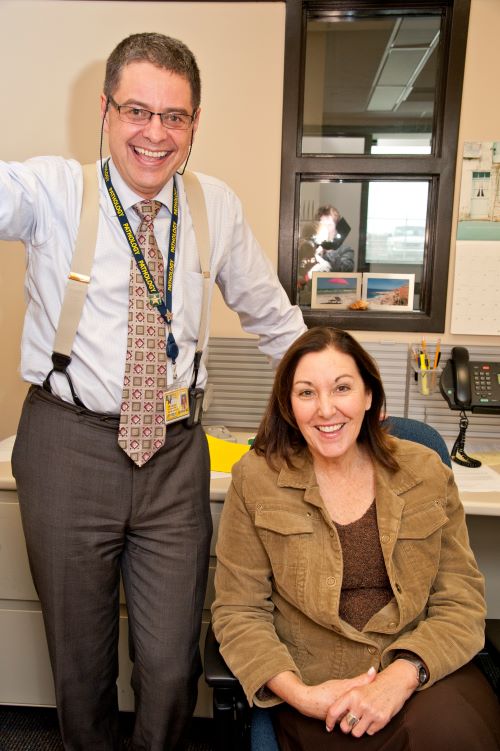 In 2011, Myers added the responsibility of being the “interim” director for MLabs, the department’s externally facing laboratory service provider. This interim position lasted until the end of 2023 when Dr. Julia Dahl succeeded him as division director. Myers shifted the focus of MLabs from being a local and regional hospital reference laboratory provider to a national provider of niche services focusing on consultation cases and molecular testing. “We started to focus on molecular pathology and the consultation practice because we could compete nationally and grow our brand while also improving the care we provided to the patients at Michigan Medicine, which was key.”
In 2011, Myers added the responsibility of being the “interim” director for MLabs, the department’s externally facing laboratory service provider. This interim position lasted until the end of 2023 when Dr. Julia Dahl succeeded him as division director. Myers shifted the focus of MLabs from being a local and regional hospital reference laboratory provider to a national provider of niche services focusing on consultation cases and molecular testing. “We started to focus on molecular pathology and the consultation practice because we could compete nationally and grow our brand while also improving the care we provided to the patients at Michigan Medicine, which was key.”
When Hess departed for Indiana University, Myers considered taking a chair position elsewhere but decided to stay and work with Dr. Charles Parkos, the incoming chair. Myers advocated for a new division of quality and healthcare improvement, which was launched, and Myers became the Vice Chair for Clinical Affairs and Quality. “I have had a long-standing interest in quality and safety, and I felt we were missing some big opportunities. Chuck worked with the hospital to resource this new division, and I became the vice chair. Eileen did not have to move again. As the Vice Chair, I function as a liaison between the Chair and our Division Directors, focusing on the divisions directly involved in our clinical mission.”
Myers then shifted from his key highlights to the key lessons he has learned. “Something very important to understand is our purpose as a department and as an institution. You should be able to tell someone why the universe would suffer if you ceased to be, if there was no Michigan Medicine, no Department of Pathology. I’ve come to appreciate the importance of understanding our purpose, which is to make a difference in the lives of people who look to us for help and hope. That extends to all our missions. The clinical mission means extending hope to those who are looking to us for help today. The education mission is about making sure that those who care for us can offer us help and hope, and our discovery and research mission is all about changing the future of how others experience health and disease.”
Another lesson learned is that the most essential skill for leadership is not telling or talking; it is listening. “Being able to stand in the shoes of others, really hear their ideas, be open to them, and sift through the alternatives constructively is critically important for those in leadership roles.” Myers also learned the importance of meaningful data and information when working through difficult problems; however, that alone is insufficient. “One must also consider the experience of those who do the work and those who benefit from the work, which is not always easily understood.”
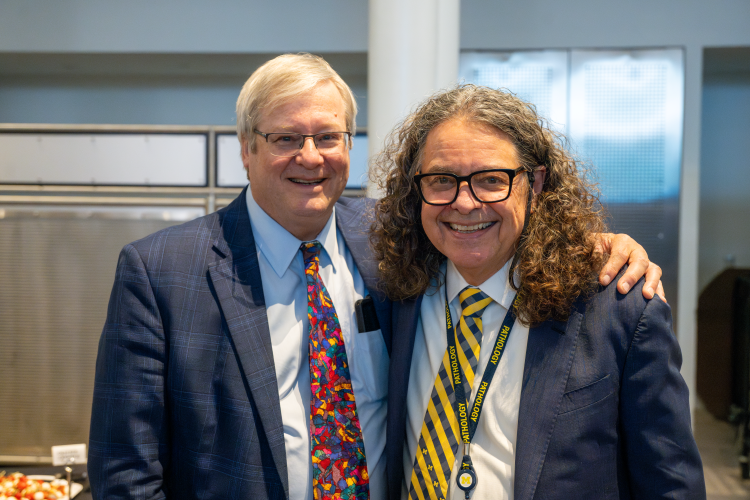 “Today, people tend to judge others by their worst moments and apply those labels for life. It is crucial to value people for who you know them to be when they are at their best selves; celebrate that and nurture it if you can. Kindness and compassion are essential skills in leadership roles. It is not about bossing people around or bending them to your will. It is about making them feel heard in an authentic and meaningful way. You still need to hold people accountable, but you have to love people as a leader.” The one area that Myers sees for continued growth is in kindness and compassion, valuing the contributions of everyone from those who clean the facilities to the staff who work in administration and the laboratories to the faculty and leadership.
“Today, people tend to judge others by their worst moments and apply those labels for life. It is crucial to value people for who you know them to be when they are at their best selves; celebrate that and nurture it if you can. Kindness and compassion are essential skills in leadership roles. It is not about bossing people around or bending them to your will. It is about making them feel heard in an authentic and meaningful way. You still need to hold people accountable, but you have to love people as a leader.” The one area that Myers sees for continued growth is in kindness and compassion, valuing the contributions of everyone from those who clean the facilities to the staff who work in administration and the laboratories to the faculty and leadership.
The final thing Myers learned is that while relationships with providers are critically important, we need to value our relationships with patients even more. “Working with patients and their families reconnects us to our purpose in a meaningful way, to be sure we are aligned in what we value collectively.”
When asked for advice he would give to aspiring leaders, he commented, “Aspiring leaders are often self-selected, and leadership may not come with a title. Leaders are those that people want to follow. They have to pay attention to opportunities and, when doors open, choose to walk through them. Leaders can’t help themselves – they will say yes when others say no. If you choose to be a leader, remember, how people see you matters. That means, even on a bad day, when you’re not feeling very happy or positive, you do not have the privilege of wearing that on your sleeve because your job is to make sure that others see a bright future, even when it may look dim to you. That’s your job. If you say yes to a leadership role, you are not doing that for yourself. Your focus is everybody else. Your job is to take care of them and take care of business. Your first priority is not to take care of yourself, although you do have to do that, too. It is not about you. It is about everybody else.”
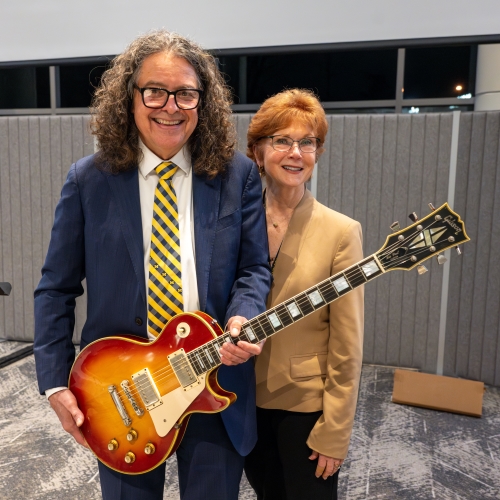 As he heads into retirement, Myers will be available to consult with department leadership over the next several months but will not continue doing clinical work. Beyond that, he plans to take life one day at a time. He will focus on his wife and family, travel to spend time with them, practice his guitar while learning more music theory, and performing with his mates in two different bands: Lost in Processing and Geezer.
As he heads into retirement, Myers will be available to consult with department leadership over the next several months but will not continue doing clinical work. Beyond that, he plans to take life one day at a time. He will focus on his wife and family, travel to spend time with them, practice his guitar while learning more music theory, and performing with his mates in two different bands: Lost in Processing and Geezer.
Thank you, Dr. Myers, for all the lessons you have taught us, your leadership, and bringing fresh perspectives and culture to our department. We wish you the best in your well-deserved retirement.